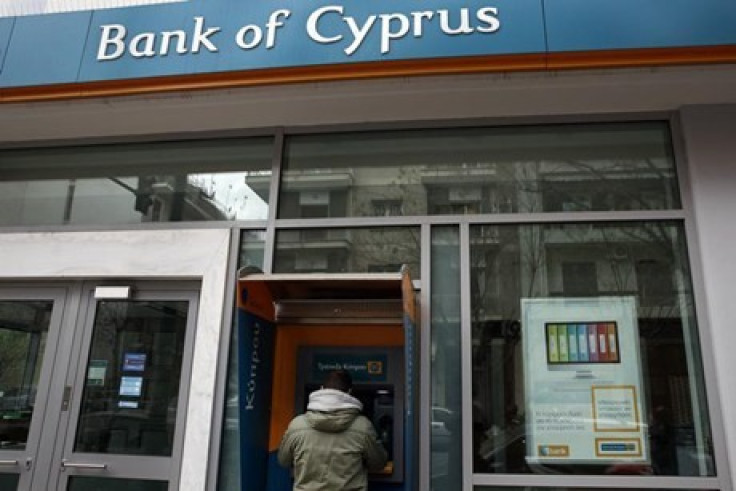Cyprus' Lawmakers Plan Depositor Tax Debate As Markets Tumble
Eurozone rescue package for Cyprus calls for unprecedented €5.8bn levy on savers to prevent banking system collapse

Cypriot lawmakers will debate an unprecedented tax on savers Monday, just weeks after the country's new president promised to ring-fence depositors from financial rescue talks with the Eurozone.
President Nicos Anastasiades may struggle to convince his Parliamentary colleagues that the tax, which applies for the first time to insured deposits in the nation's banks, is an unavoidable portion of a €10bn financial aid package necessary to avoid a collapse of the country's banking system. His centre-right Disy party holds 20 seats in the 56-seat chamber and needs a further 9 seats from political rivals Akel and Edek, both of which have vowed to oppose it.
"My decision, to have the hoped-for results, needs the approval of parliament," said Anastasiades a televised statement broadcast on Cyprian television Sunday. "I appeal to the parliamentary parties that their decision, one I shall fully respect, is one guided by what is in the best interests of citizens and the homeland."
The vote, originally scheduled for Sunday, has been delayed until at least 2pm London time. The nation's banks were closed today for a scheduled public holiday and are expected to re-open tomorrow. If the levy is passed today in parliament, banks will freeze the required amount from individual accounts but will allow the free transfer of all other funds.
The European single currency fell the most in 14 months following the weekend agreement, changing hands on foreign exchange markets in Asia at $1.2913 against the US dollar, a 1.3 percent decline from Friday.
European stocks were significantly weaker in the opening minutes of trading, with the broadest measure of blue-chip share prices, the FTSE Eurofirst 300, falling more than 1 percent to 1,190.5 points.
Eurozone finance ministers agreed on Saturday to impose a 6.75 percent level on all bank deposits in Cyprus up to €100,000 and a further 9.9 percent on those above the insured threshold. The tax, which has never been applied in any of the four previous Eurozone bailouts, is expected to raise around €5.8bn, the leaders said, or 30 percent of Cyprus' tiny GDP. Around a third of the deposits are held by non-Cypriots, analysts from Barclays have estimated.
Depositors will receive shares to compensate for the tax, according to draft terms of the bailout, that will be underpinned by future revenues from the nation's developing natural gas sector.
"It's not a pleasant outcome, especially of course for the people involved. But we believe it is something that, compared with other possible outcomes, is the least onerous," Cyprus finance minister Michael Sarris told CNBC televion. "And we also believe that the exchange of this levy with shares in the banking institutions affected gives an upside potential."
Lawmakers are said to be attempting to change the terms of the deposit tax, according to several media reports - first published by the Wall Street Journal - with suggestions that the levey on deposits under €100,000 be lowered to 3 percent and the upper threshold raised to 13 percent.
Russia's Deputy Finance Minister, Anton Shatalov, told reporters Monday that a levy placed on the interest earned by depositors "would not be horrible and it would be absolutely fair". Russian businesses are major holders of euro-based deposits in Cyprus and Russia has extended more than €2.5bn in bilateral loans to the nation as part of its broader financial rescue. Moody's Investors Service estimates the equivalent of around $12bn is held in Cyprus by Russian savers.
European Union Economic and Monetary Affairs Commissioner Ollie Rehn has said such flexibility would be permitted as long as the €5.8bn cash target was met.
Investors are concerned the levy will ignite deposit flights from banks in other struggling Eurozone countries like Spain and Italy, although others have suggested the unique nature of Cyprus' banking sector - which is comprises around 80 percent of the country's GDP - makes a similar move around the single currency area unlikely.
"We consider that the scope of potential contagion to other peripheral countries in terms of deposit outflows and sovereign debt is considerably more limited than if such a decision would have been taken in previous programmes," said Barclays analysts Antonio Garcia Pascual and Laurent Fransolet in a client note published Saturday.
"Specifically, we consider the likelihood of a bank run in other periphery countries to be limited, including in Greece."
© Copyright IBTimes 2024. All rights reserved.





